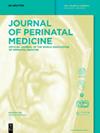既往经阴道分娩的产妇肥胖与剖宫产后试产(TOLAC)成功率之间的关系
IF 1.7
4区 医学
Q3 OBSTETRICS & GYNECOLOGY
引用次数: 0
摘要
目的 评估超重(体重指数;BMI 25.0-29.9 kg/m2)和肥胖(BMI>30 kg/m2)对剖宫产后试产(TOLAC)成功率的影响,同时考虑既往阴道分娩成功率。方法 该回顾性队列研究是利用一所大学附属三级医疗中心产科的电子数据库进行的。研究纳入了所有孕龄 37-42 周、头位胎儿为单胎活产、在 2015 年 1 月 1 日至 2021 年 5 月 5 日期间曾进行过一次低位横切口剖宫产的产妇。主要结果是分娩过程中的剖宫产率,并对既往是否经阴道分娩进行了亚组分析。结果 在符合纳入标准的 1200 例 TOLAC 分娩中,61.9% 的产妇体重指数在正常范围内,24.6% 的产妇超重(体重指数为 25.0-29.9 kg/m2),13.4% 的产妇肥胖(体重指数为 30 kg/m2 及以上)。通过多变量分析,与正常体重相比,体重指数≥30 kg/m2与剖宫产风险增加有关。然而,在 292 名有成功阴道分娩史的产妇分组中,BMI 并不影响 TOLAC 的成功率。结论 BMI 不会影响曾经阴道分娩的产妇 TOLAC 的成功率。在对患者进行咨询时应考虑到这一信息,以便更好地选择分娩方式,提高患者的满意度。本文章由计算机程序翻译,如有差异,请以英文原文为准。
The association between obesity and the success of trial of labor after cesarean delivery (TOLAC) in women with past vaginal delivery
Objectives To evaluate the effect of overweight (body mass index; BMI 25.0–29.9 kg/m2 ), and obesity (BMI>30 kg/m2 ), on the success of trial of labor after cesarean delivery (TOLAC), with consideration of successful past vaginal birth. Methods This retrospective cohort study was performed using electronic database of obstetrics department at a university-affiliated tertiary medical center. All women admitted for TOLAC at 37–42 weeks of gestational age, carrying a singleton live fetus at cephalic presentation, with a single previous low segment transverse cesarean delivery between 1/2015 and 5/2021 were included. Primary outcome was the rate of cesarean delivery during labor, and subgroup analysis was performed for the presence of past vaginal birth. Results Of the 1200 TOLAC deliveries meeting the inclusion criteria, 61.9 % had BMI in the normal range, 24.6 % were overweight (BMI 25.0–29.9 kg/m2 ), and 13.4 % were obese (BMI of 30 kg/m2 and over). Using a multivariate analysis, BMI≥30 kg/m2 was associated with increased risk of cesarean delivery compared to normal weight. However, in the subgroup of 292 women with a history of successful vaginal birth BMI did not affect TOLAC success. Conclusions BMI does not affect the success of TOLAC in women with previous vaginal birth. This information should be considered during patients counselling, in order to achieve a better selection of mode of delivery and higher patients’ satisfaction.
求助全文
通过发布文献求助,成功后即可免费获取论文全文。
去求助
来源期刊

Journal of Perinatal Medicine
医学-妇产科学
CiteScore
4.40
自引率
8.30%
发文量
183
审稿时长
4-8 weeks
期刊介绍:
The Journal of Perinatal Medicine (JPM) is a truly international forum covering the entire field of perinatal medicine. It is an essential news source for all those obstetricians, neonatologists, perinatologists and allied health professionals who wish to keep abreast of progress in perinatal and related research. Ahead-of-print publishing ensures fastest possible knowledge transfer. The Journal provides statements on themes of topical interest as well as information and different views on controversial topics. It also informs about the academic, organisational and political aims and objectives of the World Association of Perinatal Medicine.
 求助内容:
求助内容: 应助结果提醒方式:
应助结果提醒方式:


